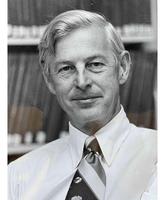Robert L. White's Cochlear Implants
Date:
Fri, 05/31/2024 - 10:30am - 12:00pm
Location:
Biomedical Innovations Building, BMI 1021, 240 Pasteur Drive, Stanford, CA
Event Type:
Hearing Seminar 
Join us for a special Stanford Hearing Seminar on the invention of the cochlear implant speech processor. May 31st at 10:30AM in Stanford BMI 1021
I am both happy and sad to announce a panel discussion to discuss Prof. Robert L. White's contributions to the very first cochlear implants. Happy, because until recently I didn't realize Stanford's contributions to this important invention. Sad, because Prof. White recently passed away and we don't get to hear from him directly. But his passing brought many of his students together and I've enjoyed the chance to hear a bit of hearing history that helps so many people hear the world around us. I think you'll enjoy this too.
This CI Hearing Seminar will be led by several of Prof. White's students who implemented the hardware and algorithms that made cochlear implants successful. They had access to auditory nerve cells in patients who lost their hearing, could electrically stimulate them, but what stimulus do you apply so people can actually understand a signal as complicated as a speech signal? The speech processor listens to the audio surrounding a patient and converts the speech signals into electrical current that drives the electrodes. The patient hears something akin to buzzy speech, and now millions of people now can understand the speech from their loved ones. It is pretty amazing, and it started at Stanford.
This seminar will be held in the Biomedical Innovations (BMI) building, near the medical center, so we can accommodate the surgeons and resident who actually do today's implants. Because of the wide interest we will have a (view-only) Zoom link and this will be recorded. But we do hope you will attend in person to join the discussion and see the first hardware that converted speech into cochlear implant signals.
The participants in the panel, all students of Dr. White's, will be Rob Mathews, Marty Walker, Les Atlas and Matt Herndon. The discussion will be moderated by Malcolm Slaney and Dr. Shayna Cooperman, an Otolaryngology Resident at Stanford.
Who: Students and colleagues of Prof. Robert L White.
What: The invention of the cochlear implant speech processor
When: 10:30AM to 12PM on Friday May 31, 2024
Where: BMI-1021, Biomedical Innovations Building, 240 Pasteur Dr., Palo Alto, CA 94304
Enter from the south west corner of the building, closest to the center of campus
Zoom: https://stanford.zoom.us/j/95515322313?pwd=bnFUczlYZDhDVmMzeXp2azRZSm9ydz09
Why: Cochlear implants are the most successful brain interface in history, they started at Stanford, and come meet the people that invented the speech processor.
The nearest parking lot is underground, near the hospital, at 200 Pasteur Drive, Stanford, CA. It is large, and when you come above ground (via the elevator or the stairs) you turn right. The BMI building is in front of you. You will need to go around the building to the *left* to get to public entrance and the seminar room.
Prof. White's obituary: https://engineering.stanford.edu/magazine/robert-white-expert-magnetics-and-former-chair-electrical-engineering-dies-96
Dr. Blair Simmons obituary (he was the first person in the US to perform direct auditory nerve stimulation on a human subject): https://jamanetwork.com/journals/jamaotolaryngology/fullarticle/220651
Biographies:
Martin Walker grew up in California, but attended MIT as an undergrad. After facing Boston winters, he retreated back to Stanford where he worked on the Auditory Prosthesis project under Professor White, receiving his PhD in 1979. He was a founder of three software companies in Silicon Valley. Later he began a second career as an expert witness in high profile intellectual property matters including patents. As an aside, he has never been adverse to Google.
Rob Mathews worked on the Prosthesis Project, He finished his PhD in '78, then continued for one year as a post-doc. From '79 - '83, he was an assistant prof in EE, originating and teaching the Mead/Conway VLSI design classes and conducting DARPA-sponsored research with his friend John Newkirk. They left Stanford to start Silicon Solutions, which sold a system for simulating IC designs; their competitor Zycad bought the company in the late 80's. After attempting another startup targeting the electric power industry, he joined Marty's one-year-old EDA startup, Frequency Technology, in the mid '90s. Many acquisitions and mergers later, he retired from ANSYS, still working on EDA software for IC design. He then worked for Marty in his expert-witness practice..
Les Atlas: After leaving the prosthesis project in 1984, Les Atlas joined what is now the Electrical & Computer Engineering at the University of Washington as an Assistant Professor. He has since been a leader in signal processing research and educational activity in the Pacific Northwest. Atlas’ research has had an impact on applications in acoustics, machine monitoring, sensor arrays, speech processing, and auditory sciences. His publication “Improving Generalization with Active Learning” initiated the machine learning area of active learning. Atlas’ recent and current research is funded by the National Science Foundation, DARPA, and the Office of Naval Research.
Matt Herndon worked on the Auditory Prosthesis (i.e., Cochlear Implant) project at Stanford for 5 years, obtaining his PhD. in Electrical Engineering. For the next 20 years, he worked at three Silicon Valley startups in the EDA field, developing software to help engineers design circuits; one of the startups was co-founded by Marty and one by Rob. He then switched to the other side of the table, spending 12 years using EDA software to design circuits for a major consumer electronics company. After retirement in 2013, he has focused on grandparenting.
Zoom information:
Join from PC, Mac, Linux, iOS or Android: https://stanford.zoom.us/j/95515322313?pwd=bnFUczlYZDhDVmMzeXp2azRZSm9ydz09
Password: 733840
Or iPhone one-tap (US Toll): +18333021536,,95515322313# or +16507249799,,95515322313#
Or Telephone:
Dial: +1 650 724 9799 (US, Canada, Caribbean Toll) or +1 833 302 1536 (US, Canada, Caribbean Toll Free)
Meeting ID: 955 1532 2313
Password: 733840
International numbers available: https://stanford.zoom.us/u/aczZ1nG4wZ
Meeting ID: 955 1532 2313
Password: 733840
SIP: 95515322313@zoomcrc.com
Password: 733840
FREE
Open to the Public

